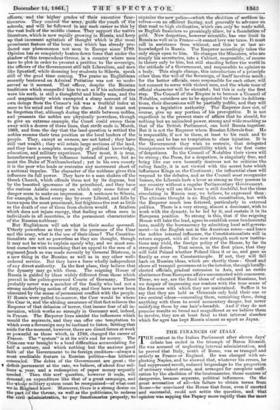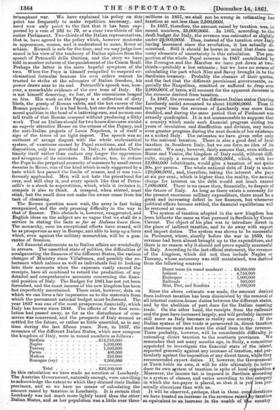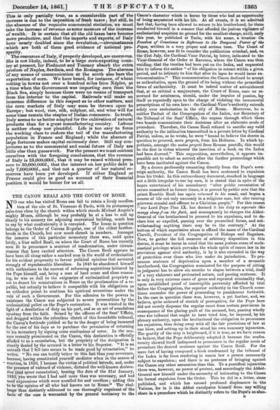THE FINANCES OF ITALY. T HE contest in the Italian Parliament
after eleven days' debate has ended in the triumph of Baron Ricasoli. He was accused of neglecting internal administration, and he proved that Italy, north of Rome, was as tranquil and orderly as France or England. He was charged with ne- glecting Naples, and he showed that, whatever his errors, he had suppressed revolt, reduced brigandage to the proportion of ordinary violent crime, and arranged for complete unifi- cation by the abolition of the lieutenancies, those centres of dangerous, because separate, political influences. On the great accusation of all—his failure to obtain terms from Rome—he convinced the House that force, even if exerted and successful, could not settle the question, and that opinion was sapping the Papacy more rapidly than the most triumphant war. We have explained his policy on this point too frequently to make repetition necessary, and need now only point to the fact that it has been sup- ported by a vote of 232 to 79, or a clear two-thirds of the entire Parliament. Two-thirds of the Italian representatives, that is, have agreed to the policy which, however moderate in appearance, means, and is understood to mean, Rome or schism. Ricasoli is safe for the time, and we may judge how sound is his view of the tendency of Italian opinion from the speech of Petrucelli della Gattina, and the story we have told in another column of the punishment of the Canon Beall. Perhaps the latter is the more hopeful symptom of the two. When the Pope is himself compelled to suspend ec- clesiastical formulas because his own orders cannot be trusted to strike at the advocates of Italian freedom, his power draws near to its end. Petrucelli's speech was, how- ever, a remarkable evidence of the new tone of Italy. He is not himself deserving, we fear, of the encomiums heaped on him. His work on the Papacy is a collection of dirty libels, the gossip of Roman valets, and the hot curses of the Roman populace. It is a bad book, but one does not demand moral qualities in the bead of a battering-ram, and no man can tell truth of that Roman cesspool without producing a filthy work. That an Italian should for two hours discourse amidst an eagerly attentive House on the crimes of the Papacy, and the anti-Italian projects of Louis Napoleon, is of itself a sign of the times of no light import. The speech was an outburst of savage disgust with the whole ecclesiastical system, of weariness caused by Papal exactions, and of the disposition, only too prevalent in Italy, to abandon Chris- tianity itself rather than endure any longer the oppression and arrogance of its ministers. His advice, too, to reduce the Pope to the perpetual necessity of massacre by small street etneutes in Rome, was of the kind which is only suggested by a hate which has passed the limits of reason, and it was voci- ferously applauded. Men will not hate the priesthood for ever, and still obey it, and every speech like that of Petru- celli's is a shock to superstition, which, while it irritates it, compels it also to think. A. cesspool, when stirred, must stink, but the smell does not make the owner cease from his task of cleansing.
The Roman question must wait, the army is fitst being reorganized, and the only pressing difficulty in the way is that of finance. This obstacle is, however, exaggerated, and English ideas on the subject are so vague that we shall do a service in stating the facts so far as Italians know them. The monarchy, once its exceptional efforts have ceased, will be as prosperous as any in Europe, and able to keep up a force which, even against the military monarchies, will be a guar rantee of freedom.
All financial statements as to Italian affairs are wretchedly in arrears. The unsettled state of politics, the difficulties of amalgamating the finances of the different States, the various changes of Ministry since Villafranca, and possibly the re- luctance which nations as well as individuals feel to looking into their accounts when the expenses vastly exceed the receipts, have all combined to retard the production of any detailed and comprehensive accounts concerning the finan- cial position of Italy. The Budget for 1861 has not yet been furnished, and the exact income of the new kingdom has been but imperfectly ascertained. There exist, however, data on which we can forth a fair impression as to the materials from which the permanent national budget must beformed. The year 1857 was one of the most prosperous, financially, which Italy has known since 1848. The effects of the first revo- lution had passed away, as far as the disturbance of com- merce was concerned, and the prospects of Italy seemed as settled for the future, or rather as little unsettled, as in any time during the last fifteen years. Now, in 1857, the revenues of the different Italian States, which now compose the kingdom of Italy, were in round numbers as follows : Sardinia £12,750,000 Naples 5,500,000 Tuscany 1,500,000 Parma 400,000 Modena 350,000 Romagna (say) 2 000,000 Total £22 500,000
In this calculation we have made no mention of Lombardy. The Austrian Government, naturally enough, were unwilling to acknowledge the extent to which they drained their Italian provinces, and so we have no means of calculating the amount raised by taxation in Lombardy. It is certain that Lombardy was not much more lightly taxed than the other Italian States, and as her population was a little over three millions in 1857, we shall not be wrong in estimating her taxation as not less than 2,500,0001. In 1857, therefore, the amount raised by taxation was, in round numbers, 25,000,0001. In 1861, according to the draft budget for Italy, the revenue was estimated at slightly under 20,000,0001. Thus, instead of the taxation over Italy having increased since the revolution, it has actually di- minished. Still it should be borne in mind that there are many elements of uncertainty in this calculation. The pro- portion of the whole Papal revenue in 1857 contributed by the Romagna and the Marches we have put down at two- thirds—probably a low estimate ; but we have no means of calculating the part which Nice and Savoy brought in to the Sardinian treasury. Probably the absence of their quotas, and the fact that the different provisional governments, es- pecially the Neapolitan, remitted or suffered to drop over 2,000,0001. of taxes, will account for the apparent decrease in the revenue derived from taxation.
In 1847, the revenue of the different Italian states (leaving Lombardy aside) amounted to about 10,000,0001. Thus in ten years' time the revenue of Lombardy was- more than doubled, and during the same period that of Piedmont was actually quadrupled. It is not unreasonable to suppose that
a country Which made such financial progress during ten
years of revolution and disaffection and division, may make even greater progress during the next decade of her existence as a united Italy. The estimates we have given refer only to the national taxation. There is also a good deal, of local taxation in Southern Italy, but we can form no idea of its amount. We may, however,, fairly assume that, even without Rome and Venice, the kingdom of Italy could, without diffi- culty, supply a revenue of 30,000,0001., which, with her 22,000,000 inhabitants, would give a taxation of not quite 30s. per person. The whole national debt of Italy is under 120,000,0001., and, therefore, taking the, interest she pays at six per cent., which is higher than the reality, the annual charge for interest on the debt would not much exceed 7,000,0001. There is no cause then, financially, to despair of the future of Italy. As long as there exists a necessity for the present enormous military expenditure, there must be a great and increasing deficit in her finances, but whenever political affairs become settled, the financial equilibrium will be restored at once.
The system of taxation adopted in the new kingdom has been hitherto the same as that pursued in Sardinia by Count Cavour. The object of his plan was to introduce direct in the place of indirect taxation, and to do away with export and import duties. The system was shown to be successful in Piedmont, where, shortly before the war in 1859, the revenue had been almost brought up to the expenditure, and there is no reason why it should not prove equally successful in. Italy. According to the last official statement, the revenue of the kingdom, which did not then include Naples or Tuscany, whose autonomy was still maintained, was derived from the following sources: Direct taxes (in round numbers) . £6,000,000
Indirect 4,750,000 Exchequer 1,000,000 Railroads 800,000 Mint, Post, and Sundries . . . 1,000,000 Since the above estimate was made, the amount derived from indirect taxation has been diminished by the removal of all internal custom-house duties between the different states, and by the abolition of port dues -for the Italian coasting trade. On the other hand, the receipts from the railroads and the post have increased largely, and will probably increase still more as Italy becomes in reality one country. If the Italian system of free trade is persevered in, direct taxation must become more and more the chief item in the revenue. There probably, however, will be considerable difficulty in extending direct taxation to the southern provinces. We remember that not many months ago, in Sicily, a cotumittee appointed to investigate the finaucial state of the island, reported generally against any increase of taxation, a id par- ticularly against the imposition of any direct taxes, wh e they recommended export duties. If, however, the Gov nment at Turin holds its own, it will be able ultimately to intro- duce its own system of taxation in spite of local op osition.e Moreover, the income tax is imposed in Sardinia ccording to a system of classes, and varies according to the category in which the tax-payer is placed, so that it is ye less per- sonally- obnoxious than with us. It will be observed, perhaps, that in these co iderations we have treated an increase in the revenue raised y taxation as equivalent to an increase in the wealth of t e country. This is only partially true, as a considerable part of the increase is due to the imposition of fresh taxes ; but still, in the absence of the requisite commercial statistics, we must take the increase of revenue as some measure of the increase of wealth. It is certain that all the old taxes have become more productive, and that the imports and exports. of Italy have nearly doubled since the revolution,—circumstances -which are both of them good evidence of national pro- sperity. The resources of Italy, if properly developed, are enormous. She is not likely, indeed, to be a large corn-exporting coun- try at present, for Piedmont and Tuscany absorb the extra produce of Naples, Sardinia, and the Romagna. The absence of any means of communication at the south also bars the exportation of corn. We have heard, for instance, of wheat rotting in towns not over a hundred miles from Naples, at a time when the Government was importing corn from the Black Sea, simply because there were no means of transport from the interior to the capital. Railroads will make an immense difference in this respect as in other matters, and the corn markets of Italy may soon be thrown open to Europe ; but wool, rice, silk, sulphur, oil, and wine will for some time remain the staples of Italian commerce. In truth, Italy seems to us better adapted for the cultivation of natural products than for a great manufacturing country. Labour is neither cheap nor plentiful. Life is too easy to force the working class to endure the toil of the manufacturing population in France and England; while the absence of large fortunes makes capital extremely dear. Still any con- jectures as to the commercial and social future of Italy are little else than guesswork. For the present we must content ourselves with the foregoing conclusions, that the revenue of Italy is 25,000,0001., that it may be raised without pres- sure to 30,000,0001., that the interest on her public debt is only 7,000,0001., and that not a quarter of her natural re- sources have been yet developed. If either England or France could give as good an account of their financial position it would be better for us all.
































 Previous page
Previous page